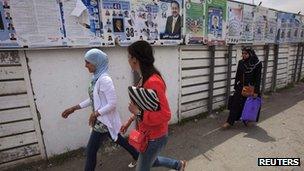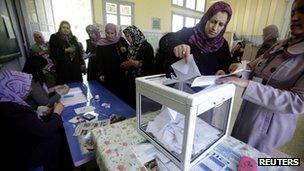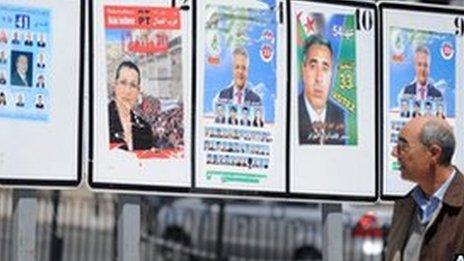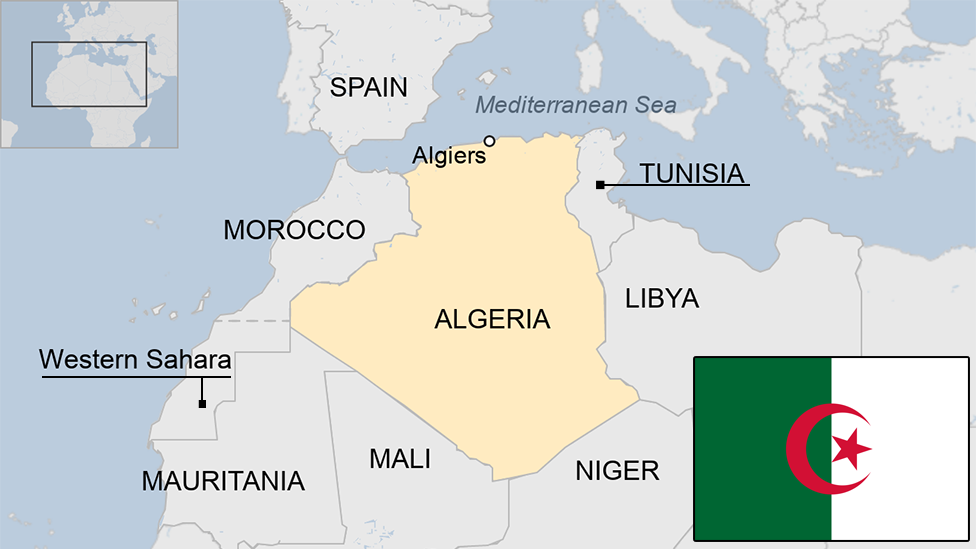Algeria votes in parliamentary elections
- Published

Many Algerians are said to be apathetic about the poll
Voting has ended in a parliamentary election in Algeria marred by a low turnout.
Dozens of new parties took part in the poll, which was billed by the authorities as more free and transparent than ever before.
But correspondents reported seeing polling stations largely deserted.
Last year's revolts in the region left the country largely untouched, but it is now under pressure to reform and renew its ageing establishment.
Algerian authorities have allowed in 500 foreign observers, but critics were unconvinced.
Despite welcoming in the observers - from the European Union, African Union and other groups - the Algerian government blocked their access to national election lists.
Under pressure to reform after last year's "Arab Spring" in the region, President Abdelaziz Bouteflika approved the establishment of 23 new political parties and an increase in the number of seats in parliament to 462.
'No lessons'
According to the interior ministry, some 25,800 candidates took part - more than double the number who stood in the previous polls, held in 2007. On average, there were more than 62 candidates for each available seat.
The two parties in the ruling coalition - the National Liberation Front (FLN) and the National Democratic Rally (RND) - and a new coalition of three Islamist parties are expected to take the lion's share of the vote.
The Islamist grouping, the new Green Algeria Coalition, consists of the Movement of Society for Peace (MSP), which recently quit the tripartite ruling alliance, the Islamic Renaissance Movement (Ennahda) and the National Reform Movement.
But correspondents say this has been an election characterised by Algerians actively avoiding the polling stations.
Speaking on state TV late on Thursday evening, Interior Minister Daho Ould Kablia said 42.9% of the electorate had turned out to cast their ballots.
However, correspondents reported seeing only a trickle of voters taking part.
The BBC's Chloe Arnold in Algiers says that at one polling station in central Algiers she did not see a single voter.
Polling booths were kept open for an extra hour in parts of the country, in a last-ditch attempt to increase the turnout, she says.
Many voters feel that even if the composition of parliament changes, it will continue to rubber-stamp any laws that the president wants to pass, our correspondent adds.

Algeria avoided the "Arab Spring" revolts last year using a combination of force and reform
One resident, Zak, who works for a logistics firm, told the BBC: "I didn't vote, for several reasons. The first thing is that I don't think the results will be fair and, secondly, it has always been like this. Always."
The foreign ministry warned foreign observers to act with "discernment, impartiality and objectivity and with discretion, far from polemics or escalation that could prejudice the credibility of its mission".
The official slogan of the election, repeated in commercials running on state television, is: "Algeria is our spring."
But Prime Minister Ahmed Ouyahia said on Saturday that the Arab Spring had been a "disaster".
"We don't need lessons from outside, our spring is Algerian, our revolution of 1 November 1954," he said during a rally.
There are no exit polls, and first results are not expected until they are released by the interior ministry on Friday.
- Published8 May 2012

- Published9 September 2024
